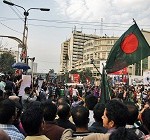Something unprecedented and potentially game-changing is underway in Bangladesh, which could improve the politics of the entire subcontinent. A youth-led effort for accountability for the crimes committed during the country’s struggle for independence, genuine secularism, and, implicitly, friendship with India, is gaining ground. This process is the reverse of the political Islam ascendant in Egypt and Tunisia after the youth uprisings that ousted secular dictators in those countries.
Will the International Crimes Tribunal set up by the Awami League succeed in indicting the leaders of the genocide that accompanied Bangladesh’s emergence as an independent nation, curtail the vitriolic anti-minority and sectarian politics of the Jamaat-e-Islami, and construct a better relationship with India? The answers to these questions depend on both external and internal factors.
Estimates vary, but by many accounts, hundreds of thousands of people were killed, 200,000 women were raped and approximately 10 million refugees crossed over into India from the then East Pakistan in 1971. These crimes were committed by the Pakistan army, aided and abetted by members of the Jamaat- e-Islami, still known as Razakars, at the behest of the then Pakistan government.
No one had been punished so far. The efforts of the Mujibur Rahman government to bring the perpetrators to justice stopped with his assassination in August 1974. In the violence-ridden politics of Bangladesh, the Sheikh Hasina government felt confident to set up the Tribunal only decades later, in 2010. The court’s first verdicts against leaders of the Jamaat in early March 2013 have triggered massive violence by the Jamaat, supported by former Prime Minister Khaleda Zia’s Bangladesh National Party (BNP) through joint hartals. More than a hundred people have already become victims of the violence.
The Jamaat has not changed its politics over the decades. Its cadres are already assaulting the leaders of the present protests, accusing them of being anti-Islam. The cadres have also been involved in violence against Hindus to such an extent that even the Jamaat’s long-time political partner, Khaleda Zia, has been forced to condemn the brutality.
But the real underlying issue is whether the silence of the last 42 years should be exposed or continue unchallenged.
Friendship between Bangladesh and India needs sincere commitment from the governments of both countries. In her second term, Sheikh Hasina has acted decisively by giving the highest state honour, the Swadhinata Sammanona award, to Indira Gandhi, posthumously. Bangladesh has acknowledged the contribution of the Indian army, which lost 3,843 soldiers during the 1971 struggle for independence, by giving bravery and friendship awards to 52 Indian soldiers. Hasina also conferred the Bangladesh Liberation War Honour on President Pranab Mukherjee during his recent state visit.
Bangladesh has shut down safe havens for Indian insurgents, extradited some of their prominent leaders and sought to resolve water and boundary issues. The Indian government has so far not reciprocated swiftly enough with agreements in water-sharing, commercial concessions and utilisation of the millions of dollars promised as credit to upgrade Bangladesh’s road and rail infrastructure.
The youth of Bangladesh, a generation born well after 1971, are now demanding long overdue accountability, secularism, and neighbourly friendship. If this project succeeds through the perseverance of the Sheikh Hasina government, Bangladesh will have shown all South Asian countries that to transcend the past it is necessary to be transparent and secular. And that democracy means inclusive politics, not vote bank politics that can only aggravate religious and social divides.
Ambassador Neelam Deo is Director, Gateway House: Indian Council on Global Relations, Mumbai. She has been India’s Ambassador to Denmark and Ivory Coast with concurrent accreditation to several West African countries, joint secretary for Bangladesh, Sri Lanka, Maldives and Myanmar.
This article was exclusively written for Gateway House: Indian Council on Global Relations. You can read more exclusive content here.
For interview requests with the author, or for permission to republish, please contact outreach@gatewayhouse.in.
© Copyright 2013 Gateway House: Indian Council on Global Relations. All rights reserved. Any unauthorized copying or reproduction is strictly prohibited.


